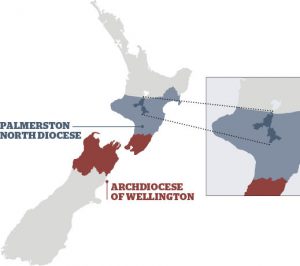
WelCom’s Hikoi of Faith returns to the Palmerston North Diocese as we continue to feature pastoral areas in the two dioceses. This year begins with a visit to Our Lady of the Snows Parish in the central North Island plateau area of Tongariro National Park and hill country areas around Taihape. Our Lady of the Snows includes a number of churches and communities from Ohakune, Raetihi, Waiouru, Taihape to Managaweka, several marae, and St Joseph’s Catholic Primary School in Taihape. The district is renowned for year-round outdoor pursuits and is economically driven by tourism, farming, market gardening, forestry, and the Waiouru Military Camp and museum.
Brief History of Pastoral Area
1852: Whanganui River Mission set up at Kaiwhaiki served by Marist priests; abandoned 1865.
1883: Permanent revival of the Whanganui River Mission at Hiruhārama/Jerusalem. Suzanne Aubert, Sisters of St Joseph and Fr C Soulas sm arrived at Jerusalem. River travel and Māori walking tracks used to visit Ruapehu and Taihape District.
1890: St Michael’s Church erected at Karioi [near Ohakune].
1891: Fr Julian Maillard arrived at Jerusalem.
1893: Bridle track cleared from Pipiriki to Raetihi, Ohakune, Karioi. Regular visits inland including Taihape made by Marist priests
1898: Fr La Croix appointed to Jerusalem with responsibility for people of the Waimarino and Main Trunk Line. Set up a Catholic Centre at Mangaweka soon after, visits Taihape for Mass.
1899: St Patrick’s Church Mangaweka opened by Bishop Redwood.
1904: St Mary’s Church Taihape opened and a house erected in Raetihi for priests’ visits.
1905: St Luke’s Church erected at Raketepauma Marae.
1907: St Patrick’s Church Raetihi blessed by Archbishop Redwood.
1908: Ohakune Parish established. Mass said in the home of Mrs Walsh, corner of Arawa and Clyde Sts.
1910: Church built in Arawa St, Ohakune.
1910: Care of Taihape area parishioners transferred from Marist to Diocesan priests.
1911: Owhango Church of St Louis built and Ohutu Church opened.
1913: Mataroa Church opened.
1914: Rangataua Church erected.
1916: House purchased for Sisters of St Joseph, in Ohakune for catechetical lessons.
1916: St Joseph’s School opened in Taihape.
1918: Raurimu Church of St Joan of Arc erected.
1918: Care of Ohakune-Raetihi parish transferred from Marist to Diocesan priests. Marists from Jerusalem visited the area including Karioi, Waiouru, and Raketepauma to minister to Māori.
1918: Catholic Presbytery built in Ohakune.
1918: St Joseph’s School Ohakune opened by Archbishop O’Shea.
1918: St Joseph’s School Mangaweka opened.
1918: Raetihi Church destroyed by the major bush fire.
1920s: Te Kingi ote Maungarongo chapel on Maungarongo Marae re-designated.
1921: St Anne’s Church erected at Rangiwahia.
1922: A permanent convent for the Sisters at Taihape opened.
1923: St Patrick’s Church Raetihi replaced.
1930: St Joseph’s Church Ohakune opened and consecrated.
1946: Ruapehu Māori Catholic Club participated in first Hui Aranga at Ōtaki.
1950: New presbytery built in Taihape.
1952: New convent built at Ohakune for Sisters of St Joseph.
1954: New St Mary’s Church in Taihape opened by Cardinal McKeefry.
1959: Catholic Women’s League began in Ohakune Parish.
1973: Marists returned to Ohakune Parish to care for parishioners.
1977: St Joseph’s School Ohakune closed. Sisters remained until 1985 for pastoral work.
1980: Parish becomes part of Palmerston North Diocese.
1981: Parish renewal. Mass in Māori on regular roster.
1985: Interior alterations made to St Joseph’s Ohakune.
1993: Extensive alterations completed in St Mary’s Taihape.
1993: Parish returned to Diocesan priests’ care.
2013: Restoration work completed on St Joseph’s Church Ohakune.
2017: ‘Our Lady of the Snows’ name adopted on Bishop Charles Drennan’s suggestion.
Christian life in Our Lady of the Snows
Bernard O’Donnell, Parish Priest
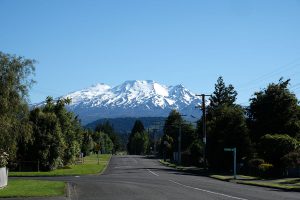
Ohakune at the foot of Mt Ruapehu. Ohakune means ‘open to a new world’.
The furthest northern reach of Palmerston North Diocese takes in the hill country around Taihape and the Plateau of the North Island. Ngāti Rangi are the original people of the land and Paerangi, the chief, was one of the first to arrive in New Zealand many years before the Great Fleet. It is believed they arrived in New Zealand on a manu, not a waka. There is a lot of history here.
The Taihape region was originally inhabited by Māori tribes who settled the area well before the arrival of Europeans; their descendants still live in the area. Winiata, 3km south of Taihape, has a marae linked to Ngāti Hinemanu, Ngāti Paki and Ngāti Hauiti.
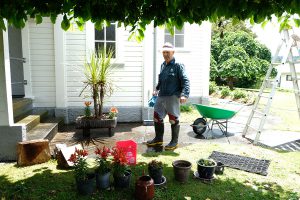
Ohakune parishioner Patrick O’Sullivan takes care of the St Joseph Church garden ‘in memory of those who are no longer with us’.
The first record of a European to the region was in 1842 to Ohakune by WJ Wakefield, son of Edward G Wakefield. In 1884, the surveyor’s party for the Main Trunk railway line cut a rough track through the district.
The Taihape township was founded in 1894 when settlers arrived from Canterbury. They set about clearing an area for a town, especially as the railway construction drew near. The site was a small natural clearing in dense native bush. People were hungry for land that they could negotiate over. The big properties drew farmers from the South Island.
Taihape’s St Mary’s Catholic Church was designed by internationally-renowned architect Ernst Plischke. Construction of this church, which replaced the original smaller one, began in 1951. Made with reinforced concrete, the large church has basilica-like qualities. With its renowned acoustics and interesting architectural features, the church draws many visitors and is a venue for a variety of community music recitals. (See p 11.)
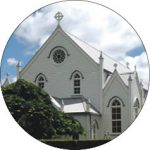
St Joseph’s Church, Ohakune.
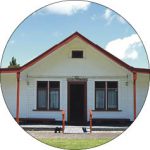
Te Kingi O Te
Maungarongo Church.
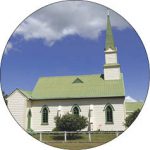
St Patrick’s Church, Mangaweka.
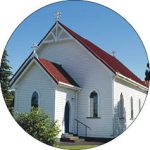
St Patrick’s Church, Raetehi.
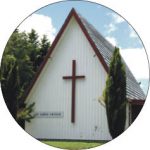
St James Church, Waiouru.

St Mary’s Church, Taihape.
In contradistinction, on the Central Plateau, the wooden churches at Raetihi and Ohakune, as well as that at Maungaroungo Marae, are older. All these churches are lovingly cared for. The spirituality of the parishioner who cares for the grounds at St Joseph’s, Ohakune, reminds visitors that a well-cared-for church and its surroundings shows love for the Church. Māori liturgy continues to be celebrated at Te Kingi o te Maugarongo regularly. St Patrick’s Church Raetihi is in the roster for the Saturday Mass.
St James’ Church at Waiouru also belongs to our area and is administered by the NZ Army. The Catholic population in and around the Waiouru Camp appreciate that Mass is celebrated there on Sunday evenings.
But all that is regular Church practice. Spiritual experience is numerous in this area with the beauty of the mountains, the associated walks and the freshness of the environment. It is not hard to appreciate God here in the ridges and valleys of the Taihape hill country and the Central Plateau. Each day is a new manifestation of who God is. The people who increasingly visit the area have these visions, and maybe even more so than those accustomed to the presence of God in nature here.
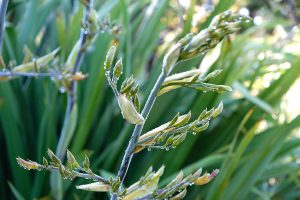 While people do not attend to church activities as they did in yester-year, they do stop to look, listen and think about the world around them. Residents and visitors are deepened as persons and come to know the immensity of the universe and more of the significance and nature of God.
While people do not attend to church activities as they did in yester-year, they do stop to look, listen and think about the world around them. Residents and visitors are deepened as persons and come to know the immensity of the universe and more of the significance and nature of God.
Why not spread your knowledge of the presence of God in your life by spending some time in Our Lady of the Snows. Just rest and relax in this manifestation of God the Creator. Let the Holy Spirit invigorate your particular spiritual approach. It is not an either-or approach, but both; and broadening our prayer life and understanding of Jesus Christ, the Special Friend. Relax away from the hassle and bustle of your busy life and let the Lord do the rest.
It is a policy in this part of the diocese for churches to be open should people like to visit and rest there while enjoying the individuality of each one. Why not spend some time here resting and relaxing in the Lord.
‘Ruapehu Romans’
Merrilyn George, Pastoral worker
While Europeans began settling on tussock land to graze sheep around Karioi in the 1860s (between Ohakune and Waiouru), the towns of Ohakune and Raetihi were mainly first settled by European after the Small Farms Settlement Act of 1892. This area became part of the Waimarino County. Farmers joined bushman to carve a living out of what seemed a harsh existence. Until the Main Trunk Line was completed in 1907, Raetihi was accessible mainly via the Whanganui River and horse and dray from Pipiriki.
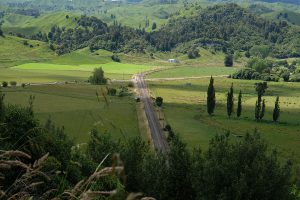
Main Trunk Line near Taihape.
It was the coming of the rail to Ohakune in 1908 that progressed the economy of the area. Timber mills flourished until the slump in the twenties to thirties.
The parish was served initially by the Marist priests out of Hiruharama–Jerusalem. Travel was from the River; on horse, along Māori tracks and then bridle tracks. Early Masses were said in family homes, often where the priest stayed overnight on journeys through.
In those early times, the Catholic European population was born mainly of Irish stock, but there were families from many European countries. The Chinese arrived in the early 1900s. They began in retail and many continued into market gardening. Māori in the area had brought their faith with them from ‘The River’. The occupations of the early parishioners were mainly farming, sawmilling and railway work. It was a transitory population.
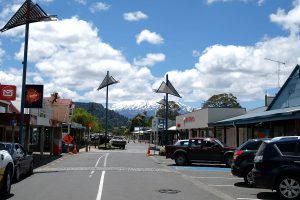
Ohakune township.
Demographics evolve, and nowadays the population is mainly involved in farming, the timber industry, market gardening and the hospitality and tourist trade. The ethnic makeup is even more diverse including families from the Philippines, Sri Lanka and India.
A milestone in the cultural history of our parish occurred after a Parish Renewal weekend in April 1983, after which the local faith community, with the support of Frs Gordon Kerins sm and Neal Wilson sm, decided to have a regular Mass in Te Reo Māori. This continues at the vigil for the second Sunday each month on Maungarongo Marae. Our regular English Mass also has many parts and music in Māori, thanks to the skills of our music ministry.
There have been many changes over the years with property, buildings and personnel, but the present formula of rostered Masses around the three churches of St Joseph’s Ohakune, St Patrick’s Raetihi and Kote Kingi ote Maungarongo on Saturday night is working. The discussions on parish matters and the decision making around the table during ‘cup of tea and eats’ after the Mass at St Joseph’s is productive.
We are able to include our regular visitors, skiers, trampers, cyclists and overseas and New Zealand travellers to create an atmosphere of hospitality, living out Our Holy Father’s advice in Amoris Laetitia No 101, and Phil 2:4: ‘Let each of you look not only to his own interests but also to the interests of others’.
Parishioners and wider community members are kept up to date with readings, reflections and news on a Facebook page called Ruapehu and Taihape Romans, along with a monthly newsletter.
St Mary’s Church, Taihape
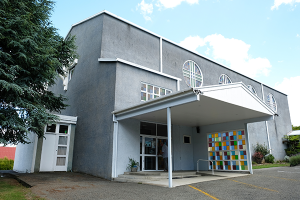
St Mary’s Church, Taihape – a modern historic building.
St Mary’s Catholic Church in Taihape was designed by Austrian-New Zealand modernist architect, Ernst Anton Plischke. Its construction began in 1951. This large church, with basilica-like qualities, is considered a modern historic building. It is included by the University of Auckland Architecture Department as a significant church for this country and one of our most unusual and dramatic church designs.
St Mary’s Church is held in high esteem by the professional architectural community as a rare example of Plischke’s ecclesiastical architecture, and as an expression of the principles of the Modern Movement. The church is mentioned in numerous national and international works on Plischke and continues to be studied by students of his work. It makes a significant contribution to New Zealand’s cultural and architectural history. The building, which emphasises the internal and the spiritual, stands as a landmark design in both religious and architectural history.
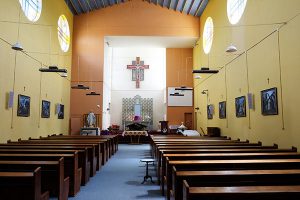 The church has a plain and traditional exterior finish with unconventional interior effects. The space is shaped by sculptural concrete walls. On entry to the church the visitor is drawn to the large ceramic crucifix above the altar. Round windows flood the interior with coloured light and fix the focus on the altar, while the use of ornamentation is limited to avoid distracting attention away from this key point. The Stations of the Cross were commissioned and painted in Europe and ceramic embellishments provided by Martin Roestenburg. The building’s spaciousness signifies of the immensity of God and the universe.
The church has a plain and traditional exterior finish with unconventional interior effects. The space is shaped by sculptural concrete walls. On entry to the church the visitor is drawn to the large ceramic crucifix above the altar. Round windows flood the interior with coloured light and fix the focus on the altar, while the use of ornamentation is limited to avoid distracting attention away from this key point. The Stations of the Cross were commissioned and painted in Europe and ceramic embellishments provided by Martin Roestenburg. The building’s spaciousness signifies of the immensity of God and the universe.
The church is in Huia St, just off SH 1 in Taihape.
Joseph’s Primary School Taihape
Ann-Maree Manson-Petherick, Principal
Our school is very fortunate to be located just outside of Taihape amongst beautiful scenery, tranquillity and wonderful grounds. Mary Mackillop founded the Sisters of Saint Joseph, and they founded our school. Mary was a woman of courage who followed her dreams. She believed through God’s love she could provide education and give human dignity to the poor. The Josephite Sisters opened our school on February 14, 1916 and we celebrated our centenary in 2016.


Our students have the benefits of being part of a smaller school in a rural setting. They bus to school from town, as well as the surrounding rural areas. Prior to 2007, the school was located in Taihape township, in what was classified as a slipzone. The relocatable buildings were moved to our present site, and the rest of the school was built new.
The school is an asset to the parish and the wider community with the Special Character being the defining point. We are blessed to have fantastic values, caring educators who strive to meet the individual needs of all children, and a caring community. Because of our location, and proximity to St Mary’s Church, we enjoy regular visits from Fr Bernard O’Donnell.
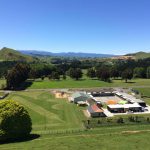
Photos: Supplied
We have a dedicated Special Character team made up of Year 8 students. There are a variety of activities they take part in both at school and around the community, including supporting classes in class prayers and school liturgies; working alongside the junior students; baking for parishioners; growing seedlings and giving these away; organising the 1 Day challenge; providing service within the school and wider community; and organising mufti days for the Missions and local foodbank.
We have a number of activities each year that the school enjoys being a part of, including the Catholic Schools Cultural Festival; skiing on Mt Ruapehu; Taihape schools’ sports days; celebrating the feast days of St Joseph and Mary Mackillop; creating and displaying artwork in the church foyer; and parish Masses. Other activities we take part in every second or third year include: a drama production for the community, which is always greatly received; a Grandparents and Friends of the School Day; a Pet Day; Taihape Schools’ Science Fair; and an art exhibition – to name a few.
St Joseph’s School, Taihape – a great school, in a unique part of the Rangitikei and Our Lady of the Snows – Gumboot Country!
Maungārongo Marae
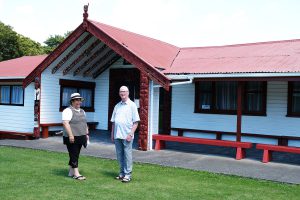
Fr Bernard O’Donnell with Ohakune-based Korty Wilson, Kaiwhakarite Māori Apostolate Coordinator.
Nestled near the foothills of Mt Ruapehu, Ohakune is home to Maungarongo Marae in Burns St. Maungarongo means ‘mountain of peace’. The main iwi of the area is Ngāti Rangi.
The marae was established by Hori Enoka Te Māreikura and his wife, Hinewaipare Te Huinga Marino. Hori Enoka was Anglican and Te Huinga was Catholic. Their daughter, Moe Ruka, composed the well-known waiata Aue Te Aroha.
The Ruapehu Māori Catholic Club is based at Maungarongo marae. The Club participates in the annual Hui Aranga, the Catholic Māori gathering at Easter.
A Vigil Mass is celebrated at the marae at 5.30pm on the 2nd Saturday of the month.
Tangiwai Memorial
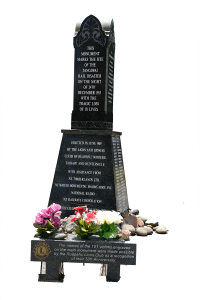 Tangiwai, 13 minutes’ drive east from Ohakune, features a memorial erected for the victims of the Tangiwai rail disaster. New Zealand’s worst ever rail disaster occurred on Christmas Eve 1953 when the Wellington-Auckland express train plunged into the Whangaehu River following the destruction of the bridge by a lahar. The memorial bears the registration plate of engine Ka949 and stands alongside the replacement bridge with Mt Ruapehu, from which the lahar flowed, in the distance. Along the road you can see the gates that are part of the early warning system that came about as a result of this tragedy. Our Lady of the Snows parishioners join the annual evening prayer service around each Christmas.
Tangiwai, 13 minutes’ drive east from Ohakune, features a memorial erected for the victims of the Tangiwai rail disaster. New Zealand’s worst ever rail disaster occurred on Christmas Eve 1953 when the Wellington-Auckland express train plunged into the Whangaehu River following the destruction of the bridge by a lahar. The memorial bears the registration plate of engine Ka949 and stands alongside the replacement bridge with Mt Ruapehu, from which the lahar flowed, in the distance. Along the road you can see the gates that are part of the early warning system that came about as a result of this tragedy. Our Lady of the Snows parishioners join the annual evening prayer service around each Christmas.
He Hīkoi Whakapono: A Journey of Faith – Our Lady of the Snows